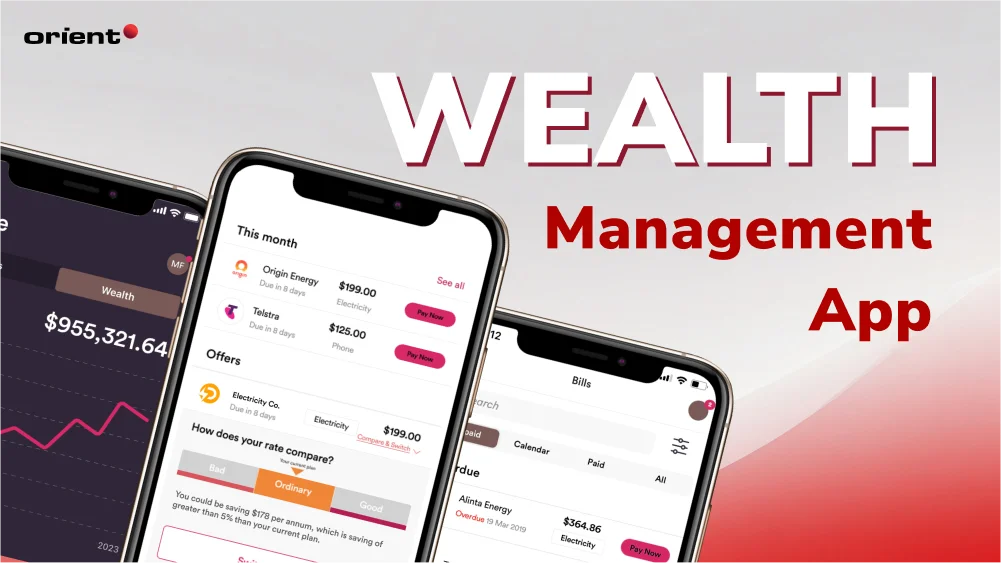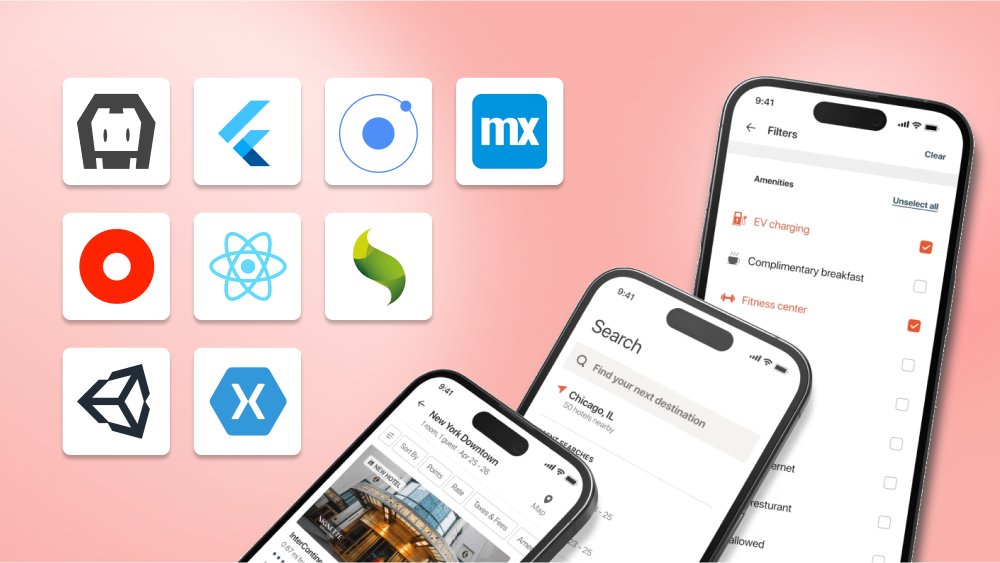Wealth Management App: Transforming Financial Strategies

Content Map
More chaptersThe shifting dynamics of macroeconomics have prompted all the players in the financial industry to rethink their operating model. This includes wealth management providers. The days of favorable and easy growth are behind us, so it is high time that companies rethink their strategies.
What better way to embrace the tide of digitization? The rise of technologies, namely artificial intelligence, machine learning, and blockchain, is slowly but surely disrupting all areas of our lives. To ride the wave of these changes, a wealth management app might be the answer you’re looking for. It is the perfect opportunity to utilize the power of technology while deepening the relationship with your valuable clients.
Key Takeaways:
- The digitalization wave is sweeping across the financial sector. Investors and wealth managers have high expectations for seamless digital experiences in wealth management apps.
- A wide range of individuals can use wealth management apps, especially those with substantial assets and looking to manage their finances, with help from professionals and automated services.
- A top-performing wealth management app provides easy access to essential insights and is easy to navigate.
What Is a Wealth Management App?

A wealth management app is a digital platform designed and created to help individuals and organizations manage their finances, investments, and overall wealth. These apps typically offer features like portfolio management, financial planning tools, budgeting, and personalized investment recommendations.
They provide real-time market insights and may integrate with users’ bank accounts and investment portfolios for a comprehensive view of financial health. Some apps also offer automated investing services, known as Robo-Advisors, for those preferring a hands-off approach. With tools for goal setting, expense management, and tax optimization, wealth management software empowers users to make informed and confident financial decisions.
Who Uses Wealth Management Apps?

Wealth management apps are useful tools for anyone seeking to track investments, simplify financial investments, and wish to receive personalized financial investments. These individuals might be:
- High-Net-Worth Individuals (HNWIs): Affluent individuals with sizeable assets often need help tracking investments, managing complicated portfolios, and optimizing tax strategies.
- Young Professionals: Younger generations, those who are accumulating wealth, often prefer digital tools to manage their investment tools and acquire real-time insights.
- DIY Investors: Those who prefer to manage their own finances often seek high-performing apps to meet their financial management needs.
- Busy Individuals: People with a hectic schedule who want to take financial management off their plates.
- Retirees or Pre-Retirees: Individuals who are nearing retirement may need the app to track savings, manage estate planning, and more.
- Small Business Owners: With multiple tasks to handle at once, small business owners might need wealth management apps to meet their financial goals.
Wealth Management Apps – Why Mobile Matters?

A report showed that the market size for wealth management platforms worldwide was estimated at USD 2.95 billion in 2023. According to projections, the market would sharply rise at a CAGR rate of 12.5% from USD 3.31 billion in 2024 to USD 8.50 billion by 2032.
The growing popularity of wealth management apps can be attributed to a number of factors, including the growing reliance on digital devices, the demand for improved client service, and the need for more engaging digital experiences.
Growing Reliance on Digital Devices
A study by J.D.Power found that Millennials and GenZ have a strong inclination towards digital communication. To be specific, digital means are their main communication channel for advice (56%), planning (59%), and service (74%). The older generations, like Boomers and Gen X, still prefer direct interaction with financial advisors for planning and consultation.
Increasing expectations in wealth management solutions come with the growing reliance on mobile devices. A 2016 study by McKinsey has pointed out the following significant facts:
- The study mentioned robo-advisors Betterment, Wealthfront, and Future Advisor as “digital attackers,” meaning companies with a digital-first approach in the finance world. Even though affluent individuals were slow to adopt digital advice, those who did were 5 to 10 times happier.
- This can be attributed to the “ digital attackers” customer-centric approach.
- The study admitted that web and mobile experiences were crucial as customers were also more aware of the digital wave.
Overall, the writing on the digital wall is clear: Holistic wealth management is here to stay. Enterprise Apps Today predicts that wealthtech will capture a formidable 30% of the market by 2025, showcasing a dramatic shift towards digitalized solutions that offer a comprehensive, one-stop-shop for all financial needs.
Demand for Improved Client Service
As we’ve mentioned earlier, those who experience digital services for wealth management are generally happier. Wealth management apps play a major role in facilitating the relationship between clients and wealth management firms. For example, every time a client has requests or questions, they can simply message their financial advisor. Gone are the days of waiting in offices or on calls for simple answers.
McKinsey Affluent and High-Net-Worth Consumer Insights Survey also showed that monthly communication with clients, instead of once or twice a year, has increased customer satisfaction scores by 52 percent.
Need For More Engaging Digital Experiences
Despite the rise of digitization after the pandemic, clients have reported dissatisfaction with their personalized wealth management experiences. Over 60% of high-net-worth individuals reported frustrating experiences when trying to access details about new wealth management products or market updates.
A well-designed app will not only keep your customers happy but also your wealth advisors satisfied. Powerful, user-friendly wealth management apps are game changers for financial professionals, enabling them to serve clients better and assist them in achieving financial success.
What Factors Constitute a Successful Wealth Management App?

Being aware that there is a strong need for a wealth management app is the start. However, to truly succeed in building one, you also need to understand the must-have elements that create successful wealth management software.
User-friendly
{L.mt-5}
A highly-rated app is a user-friendly app. Users shouldn’t stop in their tracks and wonder what to do next with the app. Tools for financial management and real-time insights should be easily accessible. Complex apps require a sharp learning curve and have a hard time keeping users engaged.
Automated Portfolio and Investment Management
{L.mt-5}
Top-tier wealth management is a comprehensive endeavor of both investment returns and planning. Retirement planning, college savings and insurance needs must also be taken into account. Other services like financial planning, one-on-one sessions with financial advisors and even financial planning software should also be included. All these tools form a well-rounded approach to wealth management that meets the various needs of today’s investors.
Another crucial aspect of the wealth management app is the use of AI in the apps. Accenture has surveyed to truly understand the impact AI has on the wealth management industry. The numbers speak for themselves:
- An overwhelming 83% of financial advisors are convinced that AI will significantly impact the client-advisor relationship, with more than half of them forecasting a transformative or revolutionary future for financial advisory.
- AI’s potential to grow financial advisors’ businesses organically is crystal clear, as 9 out of 10 advisors believe it can generate a business growth of over 20%
However, 50% of the participants also admitted they were under pressure to implement their AI vision.
Security of Accounts and Data
{L.mt-5}
Financial apps contain extremely sensitive information about their clients. Hence, robust security measures should be a top priority. This includes two-factor authentication, data encryption, access control, and data privacy policies.
Low Fees and Costs
{L.mt-5}
Determining appropriate wealth management fees allows investors to retain more of their portfolio returns over time. Fees can be assessed through various factors:
- Fee structures, e.g., asset-based fees, flat fees
- Management expense ratio for investment accounts
- Account minimums
- Trading commissions
Understanding these factors ensures that these fees don’t eat away returns while still providing valuable services to investors.
Top 3 Wealth Management Apps

Here is a quick review of the top 3 wealth management apps on the market.
Betterment
Betterment is an American financial advisory firm that offers services for cash management, retirement planning, and digital investments. Betterment is a platform that allows users to set financial goals, such as emergency fund building, long-term investment, or retirement savings through IRAs. Users provide personal details and can link their bank account for deposits. The app suggests customized investment portfolios.
Betterment Strengths
- Low fees
- Tax management features, with tax-loss harvesting
- Different portfolios for different goals
- Fractional shares
Betterment Drawbacks
- Doesn’t offer direct indexing
- Risky emergency fund
Who Should Use Betterment?
- Hand-off investors
- Retirement investors
- Those who prefer goal-based tools
Wealthfront
Wealthfront is an automated service firm. Wealthfront is a robo-advisor catering to customers wanting to maximize their wealth through technology. The app offers investment accounts, retirement accounts, college savings plans, and cash management accounts with tailored preferences.
Wealthfront Strengths
- Tax-efficient trading strategies
- 529 education investing accounts
- Bank account with modest yield and no fees
- Low advisory fees
Wealthfront Drawbacks
- Feature-richness can lead to information overload
- Absence of fractional share trading means possible excess cash holdings
Who Should Use Wealthfront?
- Hands-off investors
- Those with 529 college savings plans
SoFi Automated Investing
SoFi is an app that offers stock trading, robo advisor, and other social trading features. SoFi Invest comes with a range of services, including active trading, retirement savings, cryptocurrency trading, and automated investing. After answering basic risk-tolerance questions, SoFi recommends a customized portfolio, and users can contact a financial advisor if needed.
SoFi Strengths
- No yearly advisory fee
- Free portfolio management
- Only need $1 to get started
- No additional cost for access to financial advisors
SoFi Drawbacks
- No tax-loss harvesting
- Limited track record as a trading firm
- Limited account types
Who Should Use SoFi?
- Beginners and young investors
- Hands-off investors
- Those who need help with financial planning
Tips for Choosing the Right Wealth Management App

In addition to the three apps mentioned, there are dozens of other wealth management apps on the market. You can get overwhelmed quickly, so start with these criteria to tell the top apps apart.
Intuitive Design
The app should provide a seamless user experience. This means the app is easy to navigate right from the signup process. Updates on your finances and other real-time insights should be easily accessible.
Customizable Investment Options
Templates in investments are appreciated, but so is the ability to customize one’s investment options. The ability to hand-pick individual stocks and funds, enjoy the benefits of automated rebalancing, and harness the power of dividend reinvesting are powerful tools that allow investors to craft a personalized investment strategy, tailoring it to their unique financial goals and preferences.
Advanced Analytics and Tracking
A stand-out app goes beyond intuitive navigation and stunning designs. It also generates reports and analytics to help investors and wealth managers gain a deeper understanding of asset allocation, tax implications, portfolio performance, and more.
Available Account Types and Offerings
Look for apps that offer an all-in-one solution for your daily financial needs. This entails
- Various account offerings, e.g., IRAs, trusts, joint accounts
- Features like debit cards, savings accounts, and even loan services
Managing multiple financial products in a single app streamlines users’ financial lives and increases engagement with the app.
Customer Support and Transparency
Customer support is paramount. As wealth management involves a multitude of decisions, look for apps that offer educational resources, clear pricing and disclosure, and other social support resources.
Why Not Build Your Custom Wealth Management App?

Wealth management involves an array of features, both standardized and customizable. Instead of struggling to find the right off-the-shelf solution, you can craft a platform tailored to your unique needs, preferences, and risk tolerance.
At Orient Software, we offer our extensive expertise and experience to help you achieve this vision with ease. Let our skilled team handle the technical details while you focus on perfecting your financial strategies. Contact us today and discover a personalized path to financial success!







